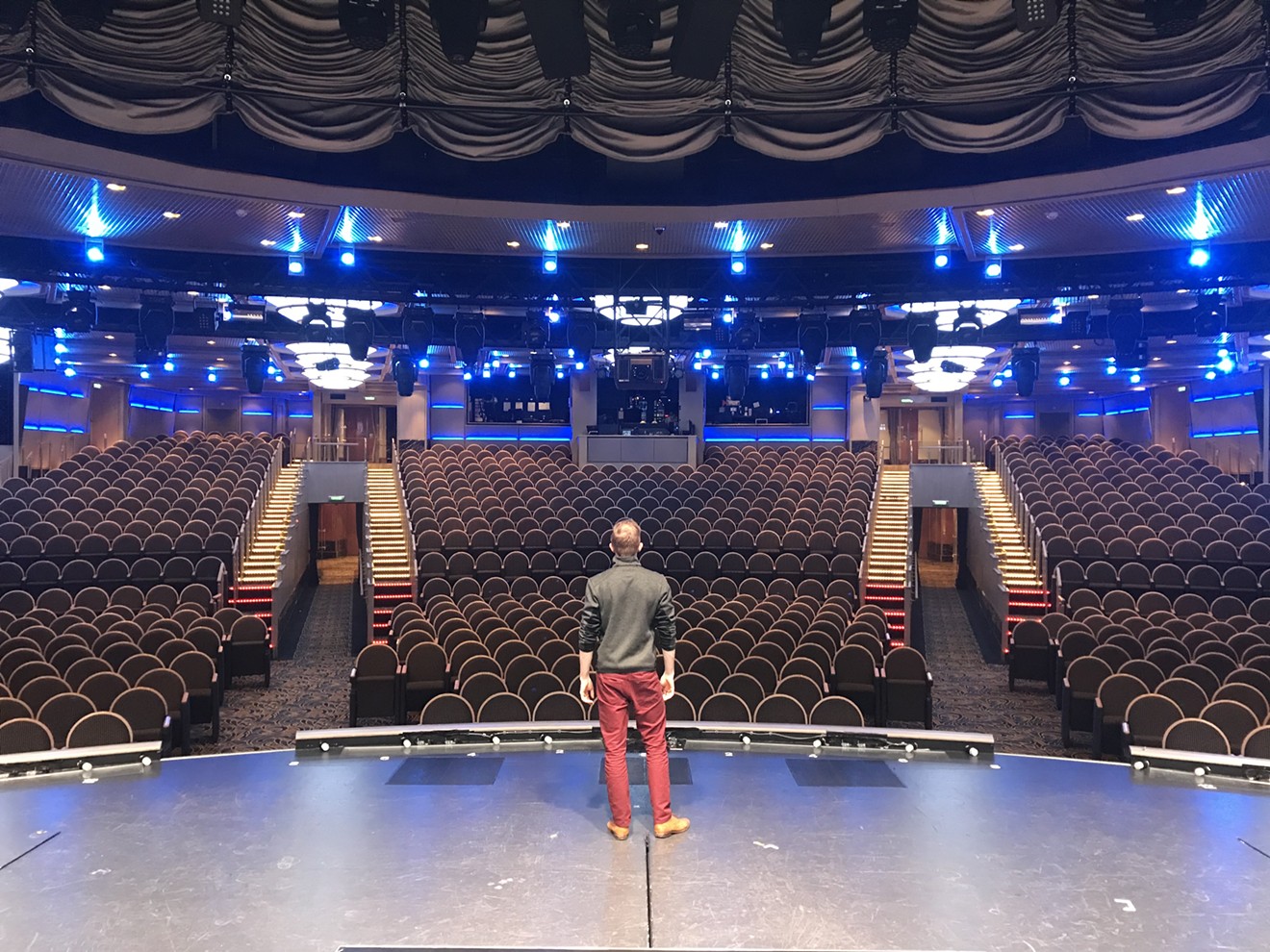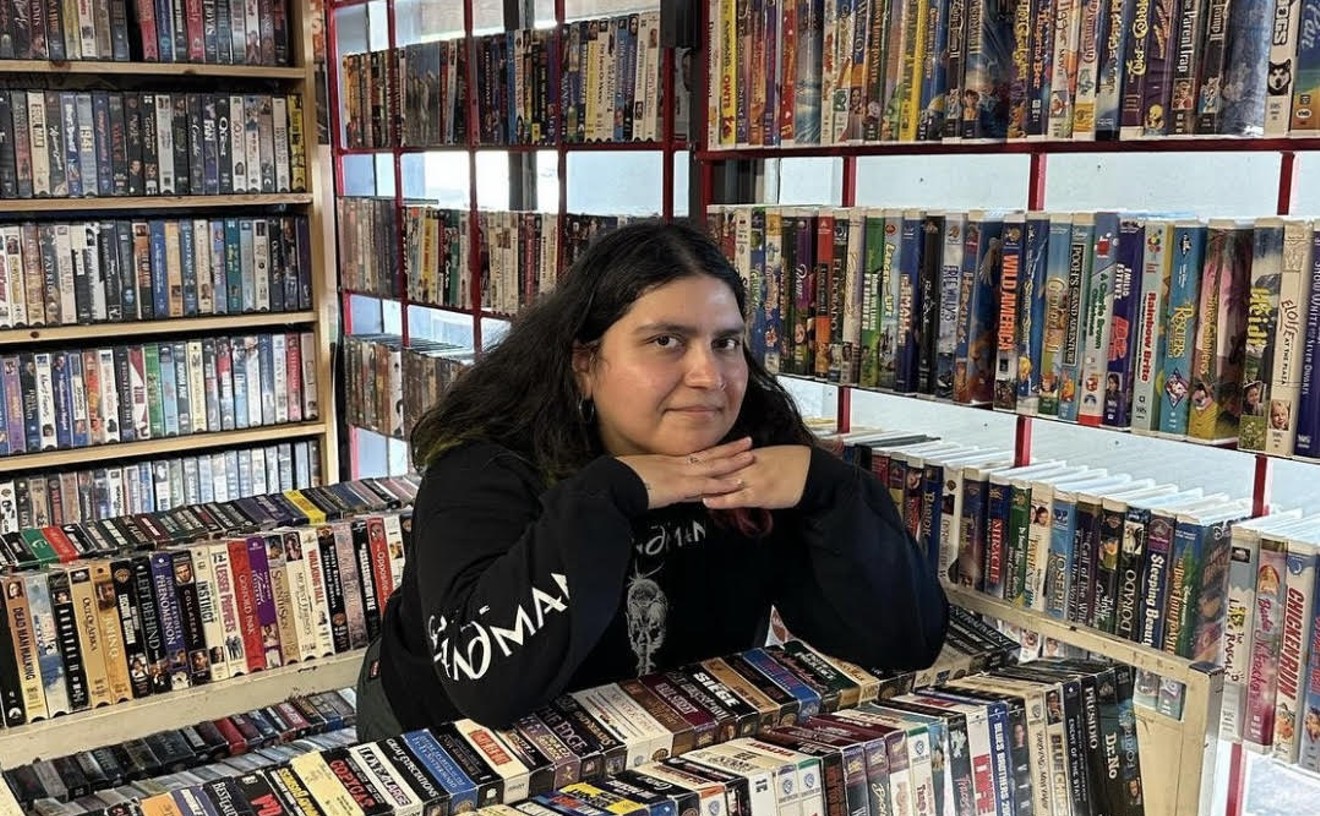The days of living on the ship, performers only coming out of their cabins when it’s time to hit the stage, are mostly a thing of the past. The engagements are much shorter, with the majority of contracted entertainers working on the cruise ships for only a week at the time. For the musicians, magicians and comedians, that week out to sea, much like on dry land, carries with it a wide variety of experiences and obstacles.
All performers start on equal footing at the beginning of a cruise, where a welcome show brings all the entertainment for the week together, giving the passengers a brief five- to 10-minute sample of what they can expect to see. For the performers, this can be daunting; they have to quickly establish what makes their talent unique for an audience still adjusting to its surroundings.
The welcome show is recorded and played throughout the duration of the cruise as an advertisement for the many performances. In the case of a comedian, this is 10 minutes of material the audience has heard many times and would most likely prefer to not hear again when attending the full show.
Aaron Aryanpur, a DFW comedian and past winner of the Funniest Comic in Texas contest, says cruise ship comics need quite a bit of material to be a successful.
“You’ve got a family-friendly set, which if you’re headlining is going to be 35 to 40 minutes," he says. "And then you’ve got your late-night set, which doesn’t have to be dirty, but they don’t want the exact same set just with some naughty language thrown in. They’re looking for different material because they’re hoping people come back.
"On top of that, there will be like a theater show later on in the week, and they’ll advertise that as being different material than anything you’ve seen so far that week. You’ve got to keep 20 minutes clean, 20 minutes kind of dirty just in your back pocket. That’s 40 minutes you’re not touching. Over the course of that week, I’m probably going through two and a half, three hours worth of material.”
In Aryanpur’s experience, comedians perform in rooms similar to comedy clubs, holding roughly 300 people and set up in a way that’s traditionally conducive to a well-produced comedy show. The comedians are also scheduled to perform in the larger cruise ship theaters that hold anywhere from 800 to 1,200 viewers.
The main difference Aryanpur feels is the general spirit of the room, with a cruise ship audience being a departure from a comedy club audience that attended specifically to laugh.
“During the best of times, it can feel like a comedy club, where you’re loose and having fun and whatever," he says. "Other times, it does feel like the hardest kind of corporate show, where you’re watching everything that you’re saying, therefore you’re always in your head, therefore you’re not really having that much fun."
DFW magician Trigg Watson worked his way from comedy clubs and corporate shows to being a regular on cruise ships throughout the year. Watson works on several different cruise lines, using an agent who works exclusively within the industry.
Watson’s break into the cruise ship circuit started with a referral from a fellow magician and a recent appearance on Penn & Teller’s television show Fool Us.
Like Aryanpur, Watson’s engagements on the cruise ships are for a week at a time as a guest entertainer. Watson estimates his year is split, with half his time performing at sea and the other half on land.
“There are, every now and then, magicians and illusionists that maybe have larger props, like a full-scale illusion show, and they might actually be on the ship for several months doing their full show," Watson says. "For a guy like myself or a comedian or a juggler or ventriloquist or singer, most of us, you know, the reason they book us is because we fit our show into our suitcases, and we’re easy to fly on and fly off."
In Watson’s experience, the number of shows he’ll perform for the week varies drastically, in some cases only two nights of the cruise. He will generally not know how many performances he’s scheduled for or what nights he’ll be going up until he’s on the ship and speaks with the cruise director.
“Sometimes you arrive on the ship, you know, at 2 p.m., and then you’re on in the theater doing two shows back to back that night,” Watson says.
Also like Aryanpur, Watson needs to be prepared to do multiple shows on any given cruise. Flexibility is needed in the cruise industry, where last-minute changes to the entertainment lineup happen with no notice. Watson travels with roughly 100 minutes of material.
KJ Gray, a six-year veteran of the Dallas music scene, can attest to the flexibility needed when performing on a cruise ship."Cruises used to be seen [as] where entertainers go to die. The hack cruise ship entertainer I feel is almost like a stereotype in our culture." - Trigg Watson
tweet this
“They wanted us to do a lot of Latin music, which we usually do four, maybe five songs of Latin music, but we had to do a full 90-minute set of Latin music," Gray says. "It was challenging, but it turned out to be actually really dope. We probably had the music for three weeks, and then two rehearsals between when we got the music and when we left.”
Gray knows musicians who have entered six-month contracts, but he was grateful to have the guest entertainer contract for a weeklong engagement. Gray played four times but cannot remember a specific number of times his band was contracted to play. It performed in three rooms similar in size to Club Dada and in one case played on the deck.
The cruise ship Gray played on gave him and his band members a "look book" that provided specific instructions on what clothes they were allowed to wear when on their own time. Fraternizing with guests was strictly prohibited, so the band members were careful with how they interacted with others during the week.
Gray, who performs Tuesday nights at Three Links with his band, Friday’s Foolery, appreciated the opportunity to work on a cruise but prefers playing on dry land where he's free to play original music.
“I wouldn’t trade the experience at all — definitely a hella great gig," he says. "I tell a lot of my friends, ‘Man, if you can do one, then go ahead and do it.’ But it’s definitely not worth missing out on a bunch of stuff you have going on here."
Although performers' experiences vary, they agree that the amount of work that goes into being a cruise ship entertainer is taxing and requires a high skill level.
“I think the cruise industry has changed a lot, too," Watson says. "Cruises used to be seen [as] where entertainers go to die. The hack cruise ship entertainer I feel is almost like a stereotype in our culture. The entertainment quality, too, is different than what people used to expect. They’re really getting in quality acts, flying them in and out all the time.”











